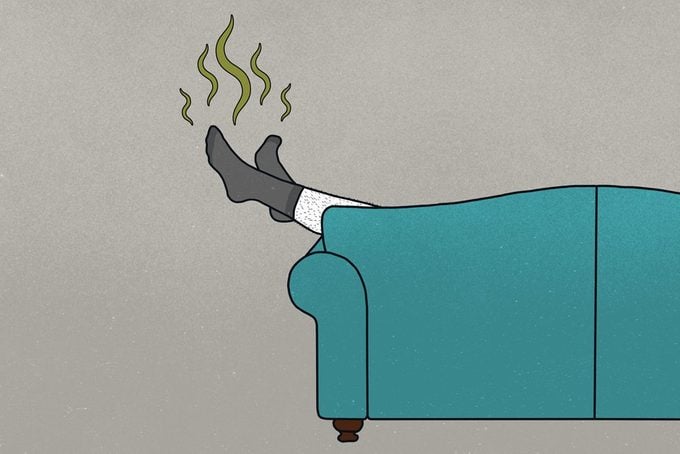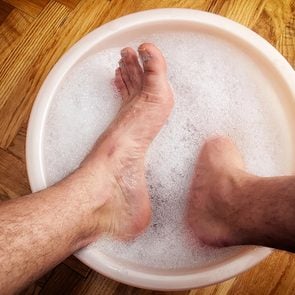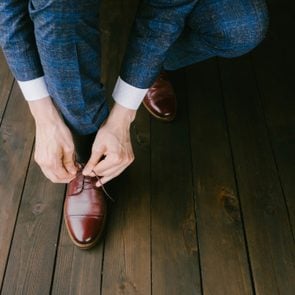10 Reasons for Smelly Feet—and 10 Solutions
Updated: May 26, 2021
Poor hygiene, excessive sweating, and athlete's foot are just some of the causes of smelly feet. Learn more about the causes and treatments.
Why do my feet smell?
Summer is upon us and you’re probably spending more time doing outdoor activities, which can mean a return of smelly feet and shoes.
Foot odor, clinically known as bromodosis, stems from a buildup of sweat and bacteria on the skin. While it can be funny to laugh about at times, stinky feet can be an embarrassing foot problem.
Smelly feet might not be anything serious, but in order to treat the odor effectively, you need to get to the root of the issue.
“The key point to remember is that there are different causes leading to patients having sweaty, smelly, or itchy feet,” says David Pytowski, DPM, a board-certified podiatrist at Austin Regional Clinic in Texas. “Successful treatment hinges on appropriate diagnosis.”
Here’s everything you need to know about smelly feet, including common (and not-so-common) causes and treatments.
What causes smelly feet?
There are several different reasons why you may have bad foot odor. We tapped foot experts for info on why your feet may be smelling a little too pungent these days. Determining the cause is the first step in settling on a solution.
Excessive sweating
One of the most common causes of smelly feet is hyperhidrosis—excessive sweating.
“Basically, when your feet sweat, bacteria can thrive and emit unpleasant odors, especially as we approach summer and our feet can be cooped up in professional shoes and socks, worsening this issue,” says Yolanda Ragland, DPM, a podiatrist in New York City and founder of Fix Your Feet foot treatment center.
Stress and anxiety
You know the old saying “don’t sweat the small stuff”? If stress leaves you a sweaty mess, you probably understand its meaning.
Both stress and anxiety can cause sweating, which can extend to your feet. That, in turn, contributes to foot odor.
Poor hygiene
If you wait too long between showering or changing your sweaty socks, smelly feet shouldn’t be a surprise. Thankfully, bad hygiene habits are fixable. Bathing more often should help to relieve the issue.
Athlete’s foot
Athlete’s foot is a fungal infection commonly associated with gym locker room. You’ll encounter trichophyton, the fungus that causes the infection, on floors and clothing. It’s a big fan of warm, moist environments, like public showers and pools.
The fungus affects the upper layer of the foot and can cause an unpleasant odor. It thrives when conditions are warm and wet—you know, like on a sweaty foot in a hot shoe.
To avoid developing athlete’s foot, wear shoes like rubber sandals when walking around the pool this summer and when showering in a communal locker room.
Bacterial buildup
Excessive sweating and poor hygiene can lend themselves to bacterial buildup. This can contribute to foul-smelling feet.
Excessive coffee drinking and alcohol drinking
You love your coffee (and your post-work glass of wine) but drinking too much of either can cause excessive sweating, says Dr. Ragland.
You may find that simply cutting back may help to relieve the issue.
Diabetes
If you have diabetes, you won’t necessarily have stinkier feet. But certain complications of diabetes may lead to foot odor.
Over time, chronic high blood sugar can damage the nerves in your feet, causing you to lose feeling there. With a loss of sensation, you may not be aware of cuts, sores, and blisters.
That’s a serious problem. If you don’t know they’re there, you can’t treat them. And untreated foot wounds can quickly become infected. A side effect: smelly feet.
People with diabetes can have decreased blood flow to the feet, which may make it hard for infections to heal.
This can potentially lead to gangrene, or dead tissue. If not treated properly, this can result in foot amputation.
(Here’s some foot care advice for people with diabetes.)
Perimenopause and menopause
Thanks to hormone changes, perimenopause (the transition to menopause) and menopause often come with hot flashes and excessive sweating. Unsurprisingly, you may end up with frequently sweaty feet.
Using a quality antiperspirant and maintaining good foot hygiene can help keep foot odor at bay.
Hyperthyroidism
Sweaty and smelly feet may be a warning sign of hyperthyroidism, an overactive thyroid. If you’ve adjusted your hygiene to no avail, visit your doctor to rule out other underlying issues.
Mercury poisoning
This is probably not the first thing that would come to find when trying to figure out the source of your smelly feet. But if you’re dealing with symptoms like impaired motor skills, dizziness, and double vision, you’ll likely want to talk to your doctor to rule mercury poisoning out.
One of the most common causes of mercury poisoning is eating too much seafood. Been on a seafood kick? If you’re having trouble kicking smelly feet to the curb, talk to your physician.

Fixing smelly feet
Once you know the cause of your foot odor, you can determine the best way to treat it.
If excess sweat is behind your smelly feet, you’ll want to tackle the cause of the sweating as well as prevent the sweating. For instance, lowering alcohol consumption or finding ways to manage anxiety will alleviate perspiration.
Good hygiene
The best place to start is foot hygiene: Wash your feet daily, including between the toes, Dr. Pytowski says. Make sure to also dry them very well and apply a foot powder.
“Good hygiene can prevent infections, so wash your feet regularly, make sure to dry your feet especially between the toes, change your socks a couple of times a day, and wear sandals in public places, such as gym showers and public pools,” he says.
Consider changing your socks more than once a day. It’s best to wear wicking socks made of natural or acrylic fiber blends. Cotton socks absorb moisture but do not wick the moisture away from the skin; that moisture can encourage the growth of odor-producing bacteria or fungi.
You could also avoid wearing the same pair of shoes two days in a row; if you can alternate two or more pairs, you’ll give your shoes ample time to dry out.
(Here’s why you should never wear shoes without socks.)
But you can also treat your feet with topical lotions, powders, and wipes.
Antiperspirants
In the same way that you rub it under your arms, antiperspirants can offer solutions for your feet: “Aluminum salt-based products clog sweat glands, preventing the sweat from getting through your skin to the surface,” Dr. Ragland says.
Antifungals
You can treat athlete’s foot with over-the-counter creams. Look for ingredients such as clotrimazole, miconazole, terbinafine, and tolnaftate.
But keep an eye on the problem area: “Bacterial or fungal infections are common and fairly easy to treat, but if left untreated, they could lead to more serious infections, such as cellulitis,” Dr. Pytowski explains. “For instance, cellulitis can happen when bacteria enter into the cracks of the skin caused by athlete’s foot.”
Note that sweaty feet along with redness and itching (but not necessarily odor) could be a sign of eczema or dermatitis which is treated differently than a bacterial or fungal infection, Dr. Pytowski adds.
Some bacterial and fungal infections are treated via prescription medication—either orally or topically, or a combination of the two, says Dr. Pytowski.
Natural remedies
The various home remedies tend to focus on keeping your skin dry—most are “astringents,” explains Dr. Ragland: “They cause contraction of the skin, helping to close pores and block sweat glands.”
Before you try any of these remedies, however, talk to your doctor. Depending on your health and other medical conditions, they may not be safe.
And keep this in mind: “These all have mixed or varying results in the literature typically with low satisfaction rates reported by patients,” Dr. Pytowski says. In other words, you might want to stick with proven over-the-counter treatments.
Soak your feet
A good old Epsom salt bath can help draw moisture away and close sweat glands, says Dr. Ragland. Mix a half-cup into a large bowl of warm water and soak for 10 to 20 minutes. You could also try a mix of one vinegar to two parts water.
Charcoal or baking soda
“Other natural home treatment options include charcoal-based agents, as well as baking soda-based agents that can be purchased over the counter or made at home,” Dr. Pytowski adds.
Both can dry out skin and make it inhospitable for bacteria and fungi. You can also find over-the-counter versions of these treatments.
Tea tree oil
Try a thin layer of diluted tea tree oil to sweat-prone areas, says Dr. Ragland. (Beware of the concentrated oil—it can irritate your skin.)
“Tea tree oil has natural astringents, which will give you the desired results within a few days of using it,” Dr. Ragland explains.
Medical treatments
If you have exhausted home and over-the-counter options, Dr. Ragland recommends consulting a podiatrist about medical therapies.
“While these are more invasive or pharmaceutical, these are longer lasting and have proven to be extremely effective,” she says. Just remember that these are designed to treat hyperhidrosis—they’re about slowing down perspiration.
“It is always a good idea to consult with a doctor prior to starting treatment on your own to get the right diagnosis for the best result,” Dr. Pytowski says.
These treatments can include:
Botox
A neurotoxin, botox blocks the nerves that activate the sweat glands. Used in a low dose, it prevents perspiring in the area for up to six months.
Iontophoresis
A treatment that seems to work well for hyperhidrosis, iontophoresis involves electric current traveling through water. You place your feet into a tub of water and a medical device delivers a low dose of electricity—you feel a tingle, nothing more; the sessions range from 25 to 45 minutes, and you’ll need a few before your sweat glands begin to slow down. You can also purchase an iontophoresis device for home use.
Endoscopic transthoracic sympathectomy
This operation involves cutting the sympathetic nerves that control the sweat glands through a tiny incision. While the target are nerves in the armpit, the procedure helps eliminate excessive sweating in general, including in your feet.
Anticholinergic drugs
These include glycopyrrolate, oxybutynin, benztropine, and propantheline—they work throughout the body by blocking receptors that stimulate sweating. Side effects include dry mouth, constipation, impaired taste, blurred vision, urinary retention, and heart palpitations.






















